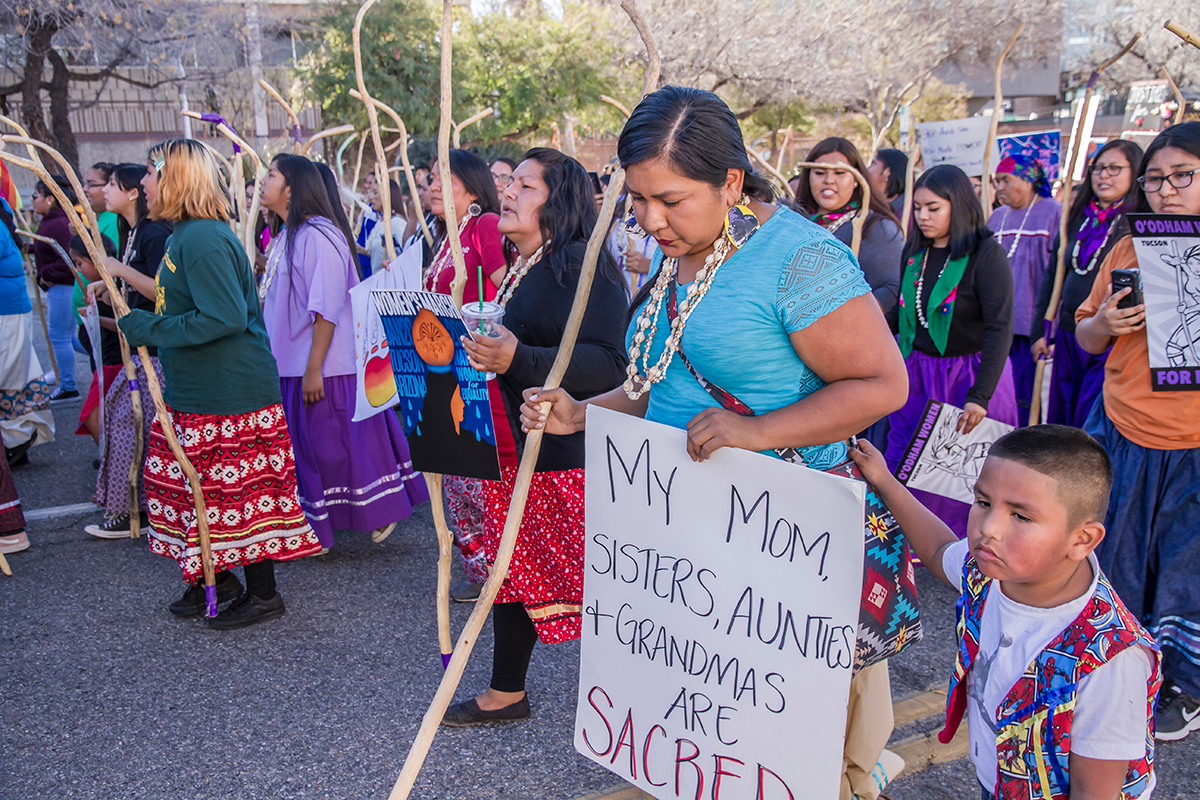
The topic of the indigenous peoples of the Americas often comes up in the fall, between Columbus Day and Thanksgiving. It often takes place in the form of debates in the media. Some want to tear down statues and rename the Columbus Day holiday because of the havoc brought upon the native populations by Columbus and others after he "discovered" the Caribbean. Others resist, saying the commemoration is good for the Italian-American communities to show their pride.
What was the "first Thanksgiving" really about? What was going on between the native populations and these European immigrants both before and after this supposed heart-warming event? And what about today? Not all Indigenous communities completely disappeared. Despite odds stacked against them, indigenous groups are still here today, though often still fighting for the right to practice their culture, speak their language and have agency over their own affairs. For the next couple of weeks, enjoy a selection of titles that showcases cultures, delves into history and looks to the future of the Indigenous Americas.
Special thanks to our Materials Processing Coordinator Leah Zande, for compiling this list. Check out more related titles in our 2021 DEI Book Display on Indigenous Peoples of the Americas.
Feature image by Dulcey Lima on Unsplash of "Tohono Indian Women led the Tucson 2019 Women’s March with a show of strength, resilience and power. This woman’s sign said: My Mom, Sisters, Aunties and Grandmas are sacred. Her son was by her side."
Native Americans (1451-2017)
Shally-Jensen, Michael (2017)
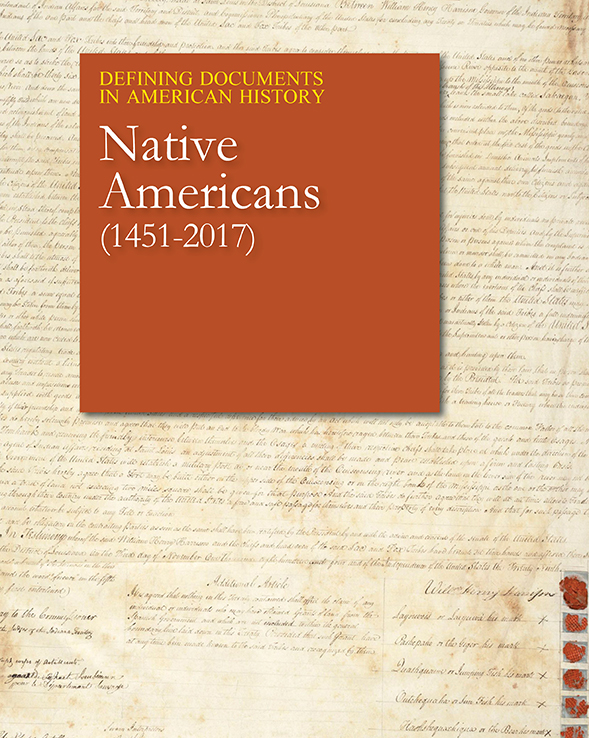 This title covers important historical documents from influential figures in Native American history. Readers will find in-depth analysis of a broad range of historical documents, including speeches, letters, legislation, court cases, and other sources about Native Americans. The set provides detailed, thought-provoking analysis of: Iroquois Thanksgiving Address -- Tecumseh: Speech to Governor Willian Henry Harrison -- Indians of All Tribes Occupation of Alcatraz: Proclamation -- Andrew Jackson on Indian Removal -- Zitkala-Sa: Old Indian Legends.
This title covers important historical documents from influential figures in Native American history. Readers will find in-depth analysis of a broad range of historical documents, including speeches, letters, legislation, court cases, and other sources about Native Americans. The set provides detailed, thought-provoking analysis of: Iroquois Thanksgiving Address -- Tecumseh: Speech to Governor Willian Henry Harrison -- Indians of All Tribes Occupation of Alcatraz: Proclamation -- Andrew Jackson on Indian Removal -- Zitkala-Sa: Old Indian Legends.
Each in-depth chapter guides readers with historical insight and comprehension. Written by historians and teachers, several elements explain the document's historical impact and provide thoughtful critical analysis, including a Summary Overview, Defining Moment, Author Biography, Document Analysis, and Essential Themes. Plus, an historical timeline and bibliography of important supplemental readings will support readers in understanding the broader historical events covered. From the first meetings between Native Americans and European settlers to twentieth-century events, this set provides thoughtful analysis of documents and speeches allowing readers to gain a better understanding of this crucial topic in American history. An important resource for the history collections of high schools, undergraduate libraries and public libraries. - Publisher's Description
Request this Title
Speaking of Indigenous Politics
Kauanui, J. Kēhaulani (2018)
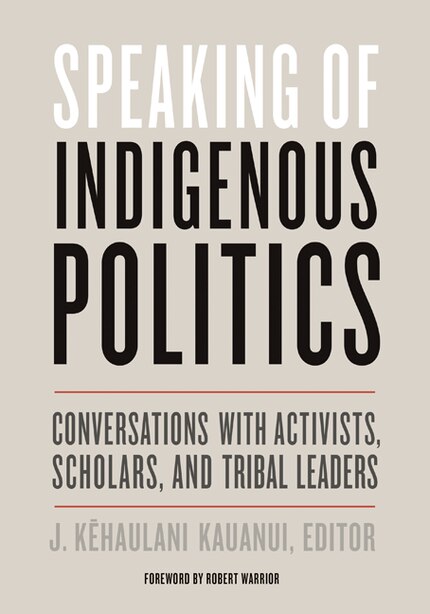 Many people learn about Indigenous politics only through the most controversial and confrontational news: the Standing Rock Sioux Tribe’s efforts to block the Dakota Access Pipeline, for instance, or the battle to protect Bears Ears National Monument in Utah, a site sacred to Native peoples. But most Indigenous activism remains unseen in the mainstream—and so, of course, does its significance. J. Kēhaulani Kauanui set out to change that with her radio program Indigenous Politics. Issue by issue, she interviewed people who talked candidly and in an engaging way about how settler colonialism depends on erasing Native peoples and about how Native peoples can and do resist. Collected here, these conversations speak with clear and compelling voices about a range of Indigenous politics that shape everyday life.
Many people learn about Indigenous politics only through the most controversial and confrontational news: the Standing Rock Sioux Tribe’s efforts to block the Dakota Access Pipeline, for instance, or the battle to protect Bears Ears National Monument in Utah, a site sacred to Native peoples. But most Indigenous activism remains unseen in the mainstream—and so, of course, does its significance. J. Kēhaulani Kauanui set out to change that with her radio program Indigenous Politics. Issue by issue, she interviewed people who talked candidly and in an engaging way about how settler colonialism depends on erasing Native peoples and about how Native peoples can and do resist. Collected here, these conversations speak with clear and compelling voices about a range of Indigenous politics that shape everyday life.
Land desecration, treaty rights, political status, cultural revitalization: these are among the themes taken up by a broad cross-section of interviewees from across the United States and from Canada, Mexico, Chile, Bolivia, Peru, Australia, and New Zealand. Some speak from the thick of political action, some from a historical perspective, others from the reaches of Indigenous culture near and far. Writers, like Comanche Paul Chaat Smith, author of Everything You Know about Indians Is Wrong, expand on their work—about gaming and sovereignty, for example, or protecting Native graves, the reclamation of land, or the erasure of Indian identity. These conversations both inform and engage at a moment when their messages could not be more urgent. - Publisher's Description
Request this Title
Footprints of Hopi History: Hopihiniwtiput Kukveni'at
Kuwanwisiwma, Leigh; Ferguson, T. J.; Colwell, Chip (2018)
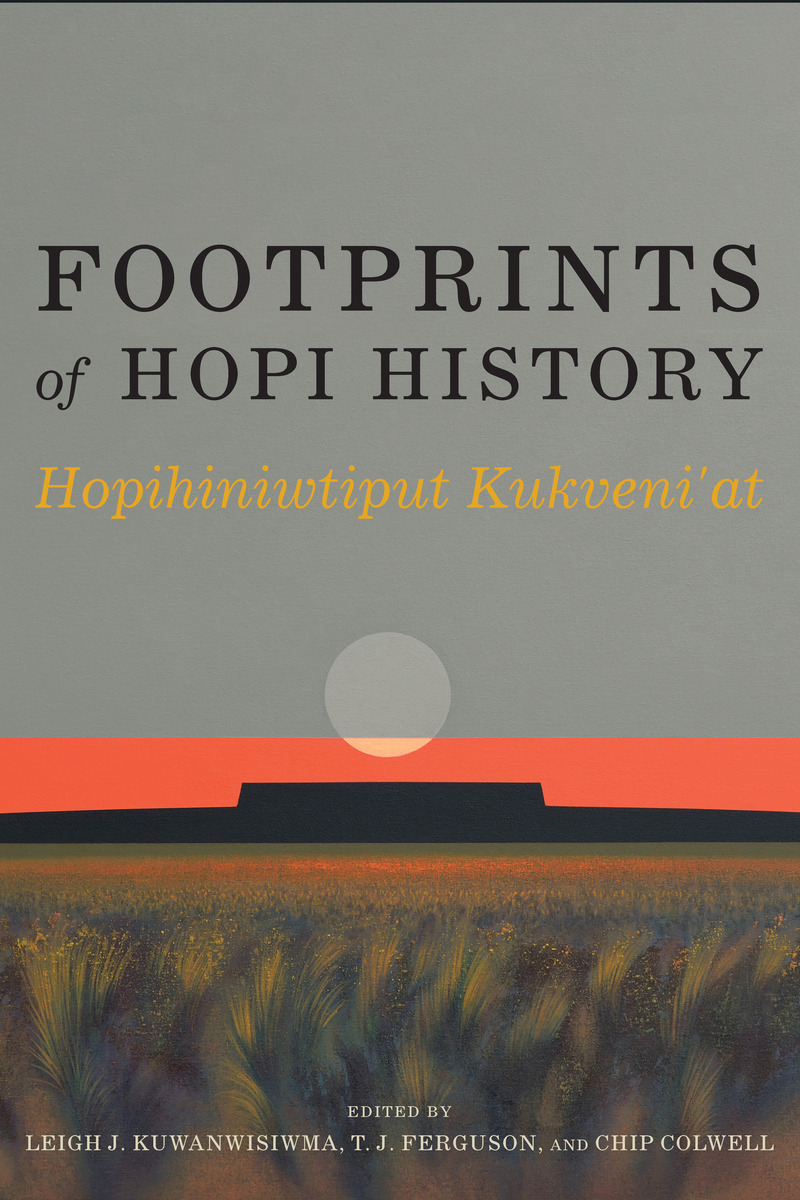 Kukveni—footprints—are a powerful historical metaphor that the Hopi people use to comprehend their tangible heritage. Hopis say that the deity Máasaw instructed their ancestors to leave footprints during their migrations from their origin place to their home today as evidence that they had fulfilled a spiritual pact to serve as stewards of his land. Today’s Hopis understand these footprints to be the archaeological remains of former settlements—pottery sherds, stone tools, petroglyphs, and other physical evidence of past use and occupation of the land.
Kukveni—footprints—are a powerful historical metaphor that the Hopi people use to comprehend their tangible heritage. Hopis say that the deity Máasaw instructed their ancestors to leave footprints during their migrations from their origin place to their home today as evidence that they had fulfilled a spiritual pact to serve as stewards of his land. Today’s Hopis understand these footprints to be the archaeological remains of former settlements—pottery sherds, stone tools, petroglyphs, and other physical evidence of past use and occupation of the land.
The fourteen chapters in "Footprints of Hopi History: Hopihiniwtiput Kukveni’at" focus on these Hopi footprints as they are understood through a variety of research techniques, including archaeology, ethnography, documentary history, plant genetics, and educational outreach. The editors and contributors offer fresh and innovative perspectives on Hopi archaeology and history, and demonstrate how one tribe has significantly advanced knowledge about its past through collaboration with archaeologists and cultural anthropologists.
The book features managerial uses of research, cultural landscape theory, use of GIS in research, archaeological interpretations of social identity and immigration, analysis of corn genetics, heritage education of youth, and research of oral traditions and documentary history. "Footprints of Hopi History" highlights the Hopi tribe’s leadership in sustained efforts to create bridges between tribal goals and anthropology, forging a path for others to follow. - Publisher's Description
Request this Title
The Arts of Indigenous health and Well-being
Van Styvendale, Nancy; McDougall, J. D.; Henry, Robert; Innes, Robert Alexander (2021)
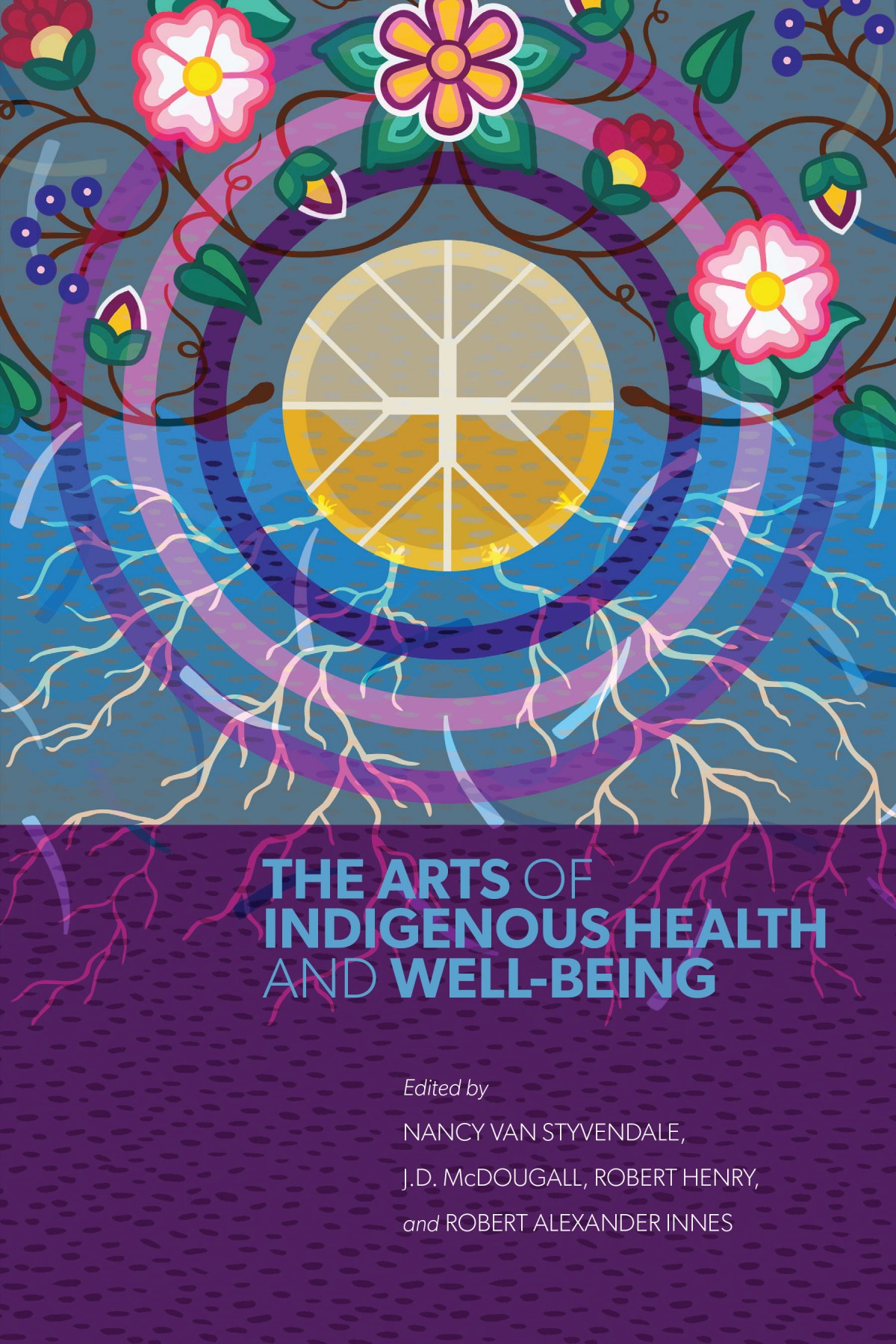 Drawing attention to the ways in which creative practices are essential to the health, well-being, and healing of Indigenous peoples, "The Arts of Indigenous Health and Well-Being" addresses the effects of artistic endeavour on the “good life”, or mino-pimatisiwin in Cree, which can be described as the balanced interconnection of physical, emotional, spiritual, and mental well-being. In this interdisciplinary collection, Indigenous knowledges inform an approach to health as a wider set of relations that are central to well-being, wherein artistic expression furthers cultural continuity and resilience, community connection, and kinship to push back against forces of fracture and disruption imposed by colonialism. The need for healing―not only individuals but health systems and practices―is clear, especially as the trauma of colonialism is continually revealed and perpetuated within health systems.
Drawing attention to the ways in which creative practices are essential to the health, well-being, and healing of Indigenous peoples, "The Arts of Indigenous Health and Well-Being" addresses the effects of artistic endeavour on the “good life”, or mino-pimatisiwin in Cree, which can be described as the balanced interconnection of physical, emotional, spiritual, and mental well-being. In this interdisciplinary collection, Indigenous knowledges inform an approach to health as a wider set of relations that are central to well-being, wherein artistic expression furthers cultural continuity and resilience, community connection, and kinship to push back against forces of fracture and disruption imposed by colonialism. The need for healing―not only individuals but health systems and practices―is clear, especially as the trauma of colonialism is continually revealed and perpetuated within health systems.
The field of Indigenous health has recently begun to recognize the fundamental connection between creative expression and well-being. This book brings together scholarship by humanities scholars, social scientists, artists, and those holding experiential knowledge from across Turtle Island to add urgently needed perspectives to this conversation. Contributors embrace a diverse range of research methods, including community-engaged scholarship with Indigenous youth, artists, Elders, and language keepers. "The Arts of Indigenous Health and Well-Being" demonstrates the healing possibilities of Indigenous works of art, literature, film, and music from a diversity of Indigenous peoples and arts traditions. This book will resonate with health practitioners, community members, and any who recognize the power of art as a window, an entryway to access a healthy and good life. - Publisher's Description
Request this Title
Making Music Indigenous
Tucker, Joshua (2019)
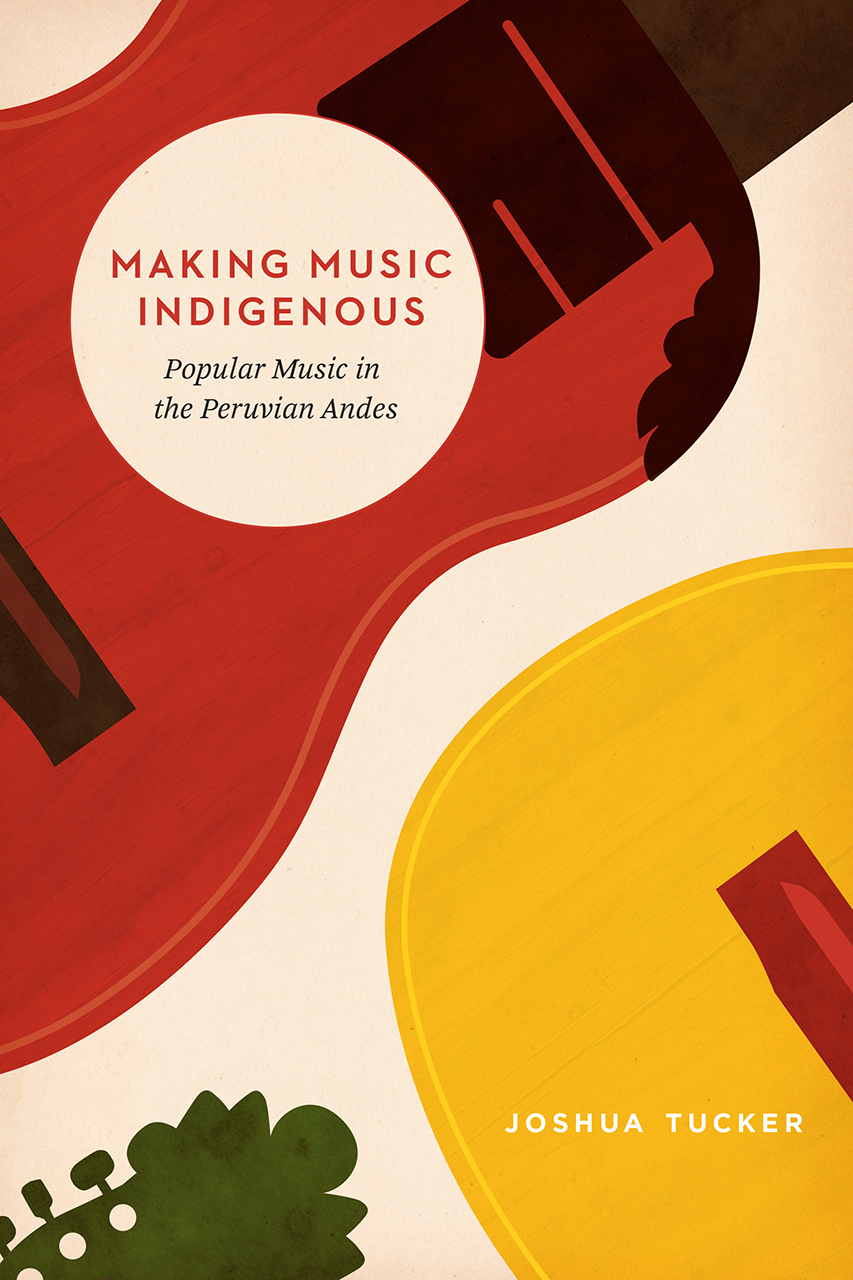 When thinking of indigenous music, many people may imagine acoustic instruments and pastoral settings far removed from the whirl of modern life. But, in contemporary Peru, indigenous chimaycha music has become a wildly popular genre that is even heard in the nightclubs of Lima. In "Making Music Indigenous," Joshua Tucker traces the history of this music and its key performers over fifty years to show that there is no single way to “sound indigenous.”
When thinking of indigenous music, many people may imagine acoustic instruments and pastoral settings far removed from the whirl of modern life. But, in contemporary Peru, indigenous chimaycha music has become a wildly popular genre that is even heard in the nightclubs of Lima. In "Making Music Indigenous," Joshua Tucker traces the history of this music and its key performers over fifty years to show that there is no single way to “sound indigenous.”
The musicians Tucker follows make indigenous culture and identity visible in contemporary society by establishing a cultural and political presence for Peru’s indigenous peoples through activism, artisanship, and performance. This musical representation of indigeneity not only helps shape contemporary culture, it also provides a lens through which to reflect on the country’s past. Tucker argues that by following the musicians that have championed chimaycha music in its many forms, we can trace shifting meanings of indigeneity—and indeed, uncover the ways it is constructed, transformed, and ultimately recreated through music. - Publisher's Description
Request this Title
Indigenous Pop: Native American Music from Jazz to Hip Hop
Berglund, Jeff; Johnson, Jan (Janis); Lee, Kimberli (2016)
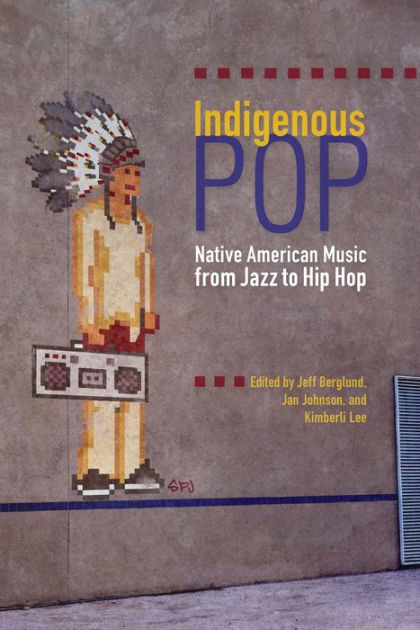 Popular music compels, it entertains, and it has the power to attract and move audiences. With that in mind, the editors of "Indigenous Pop" showcase the contributions of American Indian musicians to popular forms of music, including jazz, blues, country-western, rock and roll, reggae, punk, and hip hop. From Joe Shunatona and the United States Indian Reservation Orchestra to Jim Pepper, from Buffy Saint-Marie to Robbie Robertson, from Joy Harjo to Lila Downs, Indigenous Pop vividly addresses the importance of Native musicians and popular musical genres, establishing their origins and discussing what they represent.
Popular music compels, it entertains, and it has the power to attract and move audiences. With that in mind, the editors of "Indigenous Pop" showcase the contributions of American Indian musicians to popular forms of music, including jazz, blues, country-western, rock and roll, reggae, punk, and hip hop. From Joe Shunatona and the United States Indian Reservation Orchestra to Jim Pepper, from Buffy Saint-Marie to Robbie Robertson, from Joy Harjo to Lila Downs, Indigenous Pop vividly addresses the importance of Native musicians and popular musical genres, establishing their origins and discussing what they represent.
Arranged both chronologically and according to popular generic forms, the book gives Indigenous pop a broad new meaning. In addition to examining the transitive influences of popular music on Indigenous expressive forms, the contributors also show ways that various genres have been shaped by what some have called the “Red Roots” of American-originated musical styles. This recognition of mutual influence extends into the ways of understanding how music provides methodologies for living and survival. Each in-depth essay in the volume zeros in on a single genre and in so doing exposes the extraordinary whole of Native music. This book showcases the range of musical genres to which Native musicians have contributed and the unique ways in which their engagement advances the struggle for justice and continues age-old traditions of creative expression. - Publisher's Description
Request this Title
Indigenous Water and Drought Management in a Changing World
Sioui, Miguel (2022)
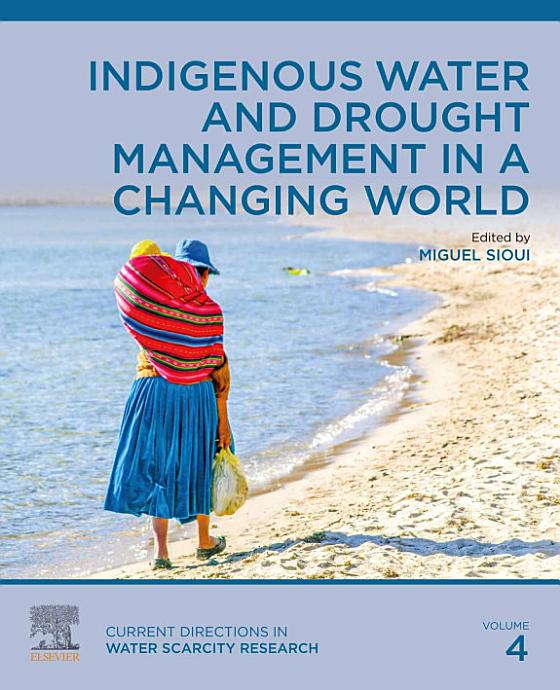 "Indigenous Water and Drought Management in a Changing World" presents a series of global case studies that examine how different Indigenous groups are dealing with various water management challenges and finding creative and culturally specific ways of developing solutions to these challenges. With contributions from Indigenous and non-Indigenous academics, scientists, and water management experts, this volume provides an overview of key water management challenges specific to Indigenous peoples, proposes possible policy solutions both at the international and national levels, and outlines culturally relevant tools for assessing vulnerability and building capacity.
"Indigenous Water and Drought Management in a Changing World" presents a series of global case studies that examine how different Indigenous groups are dealing with various water management challenges and finding creative and culturally specific ways of developing solutions to these challenges. With contributions from Indigenous and non-Indigenous academics, scientists, and water management experts, this volume provides an overview of key water management challenges specific to Indigenous peoples, proposes possible policy solutions both at the international and national levels, and outlines culturally relevant tools for assessing vulnerability and building capacity.
In recent decades, global climate change (particularly drought) has brought about additional water management challenges, especially in drought-prone regions where increasing average temperatures and diminishing precipitation are leading to water crises. Because their livelihoods are often dependent on the land and water, Indigenous groups native to those regions have direct insights into the localized impacts of global environmental change, and are increasingly developing their own adaptation and mitigation strategies and solutions based on local Indigenous knowledge (IK). Many Indigenous groups around the globe are also faced with mounting pressure from extractive industries like mining and forestry, which further threaten their water resources. The various cases presented in Indigenous Water and Drought Management in a Changing World provide much-needed insights into the particular issues faced by Indigenous peoples in preserving their water resources, as well as actionable information that can inform future scientific research and policymaking aimed at developing more integrated, region-specific, and culturally relevant solutions to these critical challenges. - Publisher's Description
Request this Title
From Filmmaker Warriors to Flash Drive Shamans
Pace, Richard (2018)
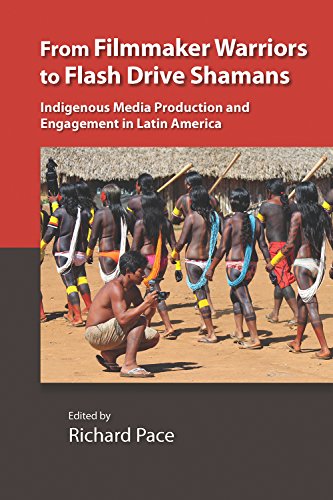 "From Filmmaker Warriors to Flash Drive Shamans" broadens the base of research on Indigenous media in Latin America through thirteen chapters that explore groups such as the Kayapó of Brazil, the Mapuche of Chile, the Kichwa of Ecuador, and the Ayuuk of Mexico, among others, as they engage video, DVDs, photography, television, radio, and the internet.
"From Filmmaker Warriors to Flash Drive Shamans" broadens the base of research on Indigenous media in Latin America through thirteen chapters that explore groups such as the Kayapó of Brazil, the Mapuche of Chile, the Kichwa of Ecuador, and the Ayuuk of Mexico, among others, as they engage video, DVDs, photography, television, radio, and the internet.
The authors cover a range of topics such as the prospects of collaborative film production, the complications of archiving materials, and the contrasting meanings of and even conflict over "embedded aesthetics" in media production—i.e., how media reflects in some fashion the ownership, authorship, and/or cultural sensibilities of its community of origin. Other topics include active audiences engaging television programming in unanticipated ways, philosophical ruminations about the voices of the dead captured on digital recorders, the innovative uses of digital platforms on the internet to connect across generations and even across cultures, and the overall challenges to obtaining media sovereignty in all manner of media production. - Publisher's Description
Request this Title
Picturing Indians: Native Americans in Film, 1941-1960
Black, Liza (2020)
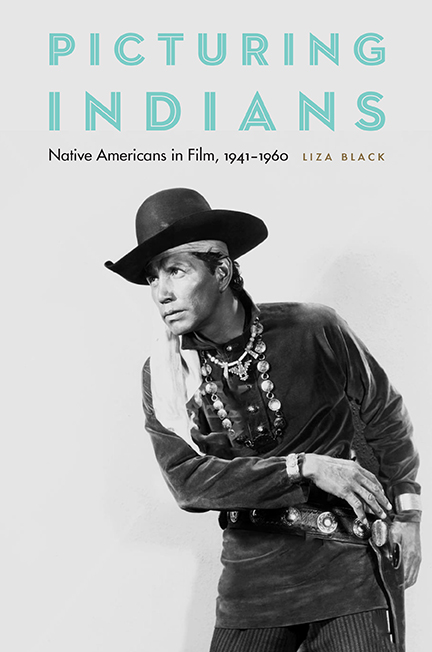 Standing at the intersection of Native history, labor, and representation, "Picturing Indians" presents a vivid portrait of the complicated experiences of Native actors on the sets of midcentury Hollywood Westerns. This behind-the-scenes look at costuming, makeup, contract negotiations, and union disparities uncovers an all-too-familiar narrative of racism and further complicates filmmakers’ choices to follow mainstream representations of “Indianness.”
Standing at the intersection of Native history, labor, and representation, "Picturing Indians" presents a vivid portrait of the complicated experiences of Native actors on the sets of midcentury Hollywood Westerns. This behind-the-scenes look at costuming, makeup, contract negotiations, and union disparities uncovers an all-too-familiar narrative of racism and further complicates filmmakers’ choices to follow mainstream representations of “Indianness.”
Liza Black offers a rare and overlooked perspective on American cinema history by giving voice to creators of movie Indians—the stylists, public relations workers, and the actors themselves. In exploring the inherent racism in sensationalizing Native culture for profit, Black also chronicles the little-known attempts of studios to generate cultural authenticity and historical accuracy in their films. She discusses the studios’ need for actual Indians to participate in, legitimate, and populate such filmic narratives. But studios also told stories that made Indians sound less than Indian because of their skin color, clothing, and inability to do functions and tasks considered authentically Indian by non-Indians. In the ongoing territorial dispossession of Native America, Native people worked in film as an economic strategy toward survival. - Publisher's Description
Request this Title
Being Indigenous in Jim Crow Virginia
Feller, Laura (2022)
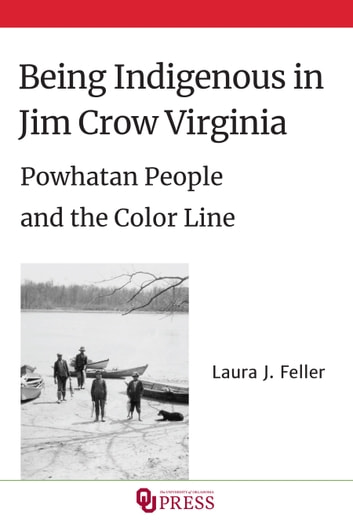 Virginia’s Racial Integrity Act of 1924 recodified the state’s long-standing racial hierarchy as a more rigid Black-white binary. Then, Virginia officials asserted that no Virginia Indians could be other than legally Black, given centuries of love and marriage across color lines. How indigenous peoples of Virginia resisted erasure and built their identities as Native Americans is the powerful story this book tells. Spanning a century of fraught history, "Being Indigenous in Jim Crow Virginia" describes the critical strategic work that tidewater Virginia Indians, descendants of the seventeenth-century Algonquian Powhatan chiefdom, undertook to sustain their Native identity in the face of deep racial hostility from segregationist officials, politicians, and institutions. Like other Southeastern Native groups living under Jim Crow regimes, tidewater Native groups and individuals fortified their communities by founding tribal organizations, churches, and schools; they displayed their Indianness in public performances; and they enlisted whites, including well-known ethnographers, to help them argue for their Native distinctness. Describing an arduous campaign marked by ingenuity, conviction, and perseverance, Laura J. Feller shows how these tidewater Native people drew on their shared histories as descendants of Powhatan peoples, and how they strengthened their bonds through living and marrying within clusters of Native Virginians, both on and off reservation lands. She also finds that, by at times excluding African Americans from Indian organizations and Native families, Virginian Indians themselves reinforced racial segregation while they built their own communities. - Publisher's Description
Virginia’s Racial Integrity Act of 1924 recodified the state’s long-standing racial hierarchy as a more rigid Black-white binary. Then, Virginia officials asserted that no Virginia Indians could be other than legally Black, given centuries of love and marriage across color lines. How indigenous peoples of Virginia resisted erasure and built their identities as Native Americans is the powerful story this book tells. Spanning a century of fraught history, "Being Indigenous in Jim Crow Virginia" describes the critical strategic work that tidewater Virginia Indians, descendants of the seventeenth-century Algonquian Powhatan chiefdom, undertook to sustain their Native identity in the face of deep racial hostility from segregationist officials, politicians, and institutions. Like other Southeastern Native groups living under Jim Crow regimes, tidewater Native groups and individuals fortified their communities by founding tribal organizations, churches, and schools; they displayed their Indianness in public performances; and they enlisted whites, including well-known ethnographers, to help them argue for their Native distinctness. Describing an arduous campaign marked by ingenuity, conviction, and perseverance, Laura J. Feller shows how these tidewater Native people drew on their shared histories as descendants of Powhatan peoples, and how they strengthened their bonds through living and marrying within clusters of Native Virginians, both on and off reservation lands. She also finds that, by at times excluding African Americans from Indian organizations and Native families, Virginian Indians themselves reinforced racial segregation while they built their own communities. - Publisher's Description
Request this Title
We are the Land: A History of Native California
Akins, Damon; Bauer, William (2021)
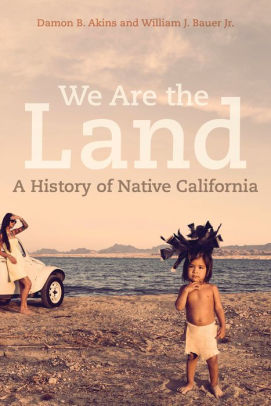 Before there was such a thing as “California,” there were the People and the Land. Manifest Destiny, the Gold Rush, and settler colonial society drew maps, displaced Indigenous People, and reshaped the land, but they did not make California. Rather, the lives and legacies of the people native to the land shaped the creation of California. "We Are the Land" is the first and most comprehensive text of its kind, centering the long history of California around the lives and legacies of the Indigenous people who shaped it. Beginning with the ethnogenesis of California Indians, "We Are the Land" recounts the centrality of the Native presence from before European colonization through statehood—paying particularly close attention to the persistence and activism of California Indians in the late twentieth and early twenty-first centuries.
Before there was such a thing as “California,” there were the People and the Land. Manifest Destiny, the Gold Rush, and settler colonial society drew maps, displaced Indigenous People, and reshaped the land, but they did not make California. Rather, the lives and legacies of the people native to the land shaped the creation of California. "We Are the Land" is the first and most comprehensive text of its kind, centering the long history of California around the lives and legacies of the Indigenous people who shaped it. Beginning with the ethnogenesis of California Indians, "We Are the Land" recounts the centrality of the Native presence from before European colonization through statehood—paying particularly close attention to the persistence and activism of California Indians in the late twentieth and early twenty-first centuries.
The book deftly contextualizes the first encounters with Europeans, Spanish missions, Mexican secularization, the devastation of the Gold Rush and statehood, genocide, efforts to reclaim land, and the organization and activism for sovereignty that built today’s casino economy. A text designed to fill the glaring need for an accessible overview of California Indian history, "We Are the Land" will be a core resource in a variety of classroom settings, as well as for casual readers and policymakers interested in a history that centers the native experience. - Publisher's Description
Request this Title
Stories From Quechan Oral Literature
Halpern, A.M.; Miller, Amy (2014)
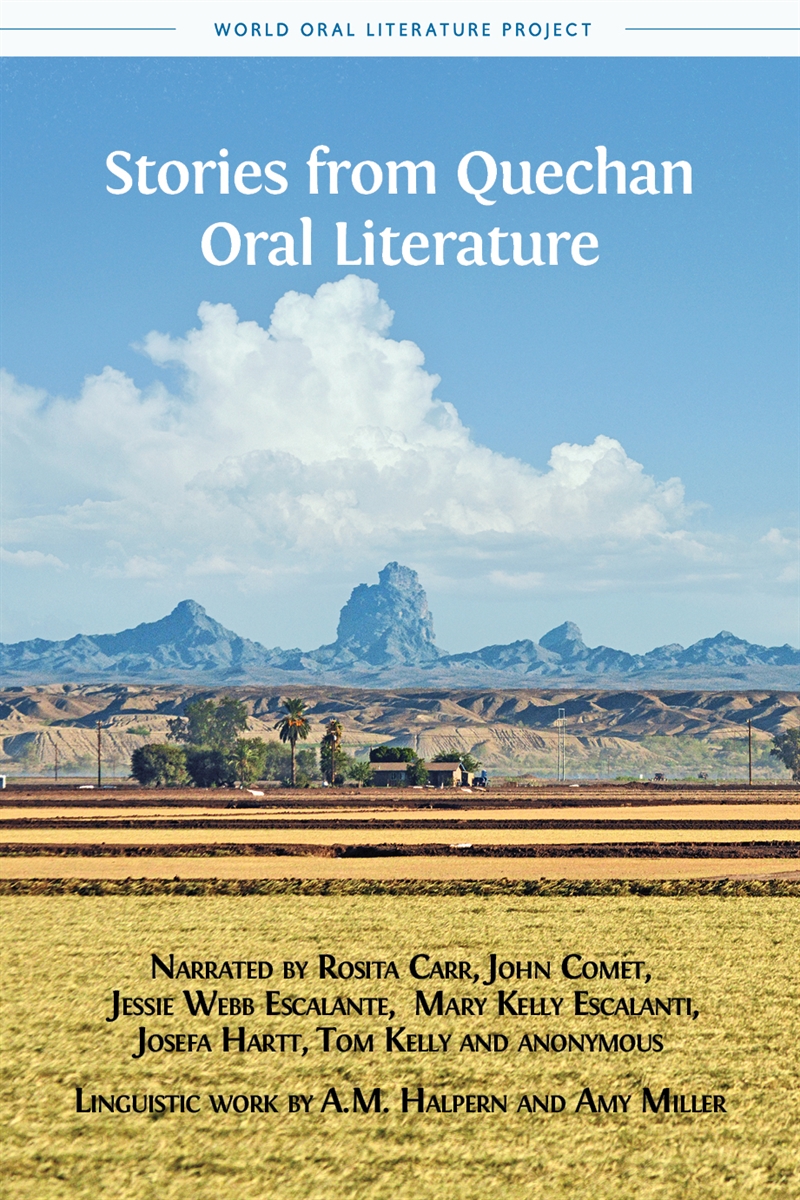 The Quechan are a Yuman people who have traditionally lived along the lower part of the Colorado River in California and Arizona. They are well known as warriors, artists, and traders, and they also have a rich oral tradition. The stories in this volume were told by tribal elders in the 1970s and early 1980s. The eleven narratives in this volume take place at the beginning of time and introduce the reader to a variety of traditional characters, including the infamous Coyote and also Kwayúu the giant, Old Lady Sanyuuxáv and her twin sons, and the Man Who Bothered Ants.
The Quechan are a Yuman people who have traditionally lived along the lower part of the Colorado River in California and Arizona. They are well known as warriors, artists, and traders, and they also have a rich oral tradition. The stories in this volume were told by tribal elders in the 1970s and early 1980s. The eleven narratives in this volume take place at the beginning of time and introduce the reader to a variety of traditional characters, including the infamous Coyote and also Kwayúu the giant, Old Lady Sanyuuxáv and her twin sons, and the Man Who Bothered Ants.
This book makes a long-awaited contribution to the oral literature and mythology of the American Southwest, and its format and organization are of special interest. Narratives are presented in the original language and in the storytellers' own words. A prosodically-motivated broken-line format captures the rhetorical structure and local organization of the oral delivery and calls attention to stylistic devices such as repetition and syntactic parallelism. Facing-page English translation provides a key to the original Quechan for the benefit of language learners. The stories are organized into "story complexes", that is, clusters of narratives with overlapping topics, characters, and events, told from diverse perspectives. In presenting not just stories but story complexes, this volume captures the art of storytelling and illuminates the complexity and interconnectedness of an important body of oral literature. "Stories from Quechan Oral Literature" provides invaluable reading for anyone interested in Native American cultural heritage and oral traditions more generally. - Publisher's Description
Request this Title
Creating Private Sector Economies in Native America
Miller, Robert; Jorgensen, Miriam; Stewart, Daniel (2014)
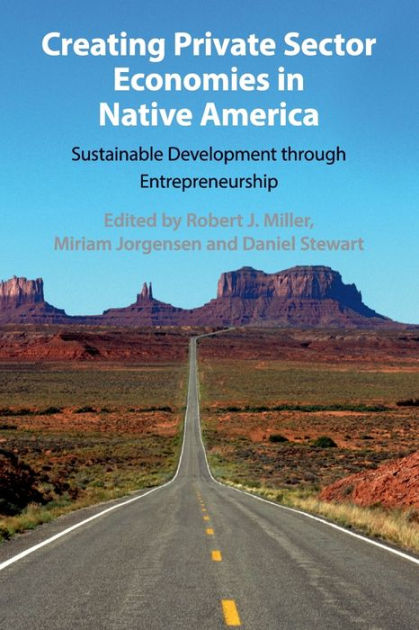 Native nation economies have long been dominated by public sector activities - government programs and services and tribal government-owned businesses - which do not generate the same long-term benefits for local communities that the private sector does. In this work, editors Robert Miller, Miriam Jorgensen, Daniel Stewart, and a roster of expert authors address the underdevelopment of the private sector on American Indian reservations, with the goal of sustaining and growing Native nation communities, so that Indian Country can thrive on its own terms.
Native nation economies have long been dominated by public sector activities - government programs and services and tribal government-owned businesses - which do not generate the same long-term benefits for local communities that the private sector does. In this work, editors Robert Miller, Miriam Jorgensen, Daniel Stewart, and a roster of expert authors address the underdevelopment of the private sector on American Indian reservations, with the goal of sustaining and growing Native nation communities, so that Indian Country can thrive on its own terms.
Chapter authors provide the language and arguments to make the case to tribal politicians, Native communities, and allies about the importance of private sector development and entrepreneurship in Indigenous economies. This book identifies and addresses key barriers to expanding the sector, provides policy guidance, and describes several successful business models - thus offering students, practitioners, and policymakers the information they need to make change. - Publisher's Description
Request this Title
Defend the Sacred
McNally, Michael David (2020)
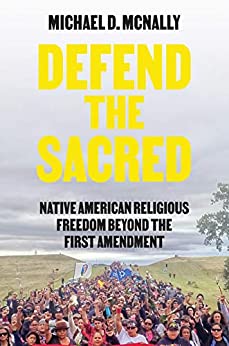 From North Dakota's Standing Rock encampments to Arizona's San Francisco Peaks, Native Americans have repeatedly asserted legal rights to religious freedom to protect their sacred places, practices, objects, knowledge, and ancestral remains. But these claims have met with little success in court because Native American communal traditions don't fit easily into modern Western definitions of religion. In "Defend the Sacred," Michael McNally explores how, in response to this situation, Native peoples have creatively turned to other legal means to safeguard what matters to them. To articulate their claims, Native peoples have resourcefully used the languages of cultural resources under environmental and historic preservation law; of sovereignty under treaty-based federal Indian law; and, increasingly, of Indigenous rights under international human rights law. Along the way, Native nations still draw on the rhetorical power of religious freedom to gain legislative and regulatory successes beyond the First Amendment. The story of Native American advocates and their struggle to protect their liberties, "Defend the Sacred" casts new light on discussions of religious freedom, cultural resource management, and the vitality of Indigenous religions today. - Publisher's Description
From North Dakota's Standing Rock encampments to Arizona's San Francisco Peaks, Native Americans have repeatedly asserted legal rights to religious freedom to protect their sacred places, practices, objects, knowledge, and ancestral remains. But these claims have met with little success in court because Native American communal traditions don't fit easily into modern Western definitions of religion. In "Defend the Sacred," Michael McNally explores how, in response to this situation, Native peoples have creatively turned to other legal means to safeguard what matters to them. To articulate their claims, Native peoples have resourcefully used the languages of cultural resources under environmental and historic preservation law; of sovereignty under treaty-based federal Indian law; and, increasingly, of Indigenous rights under international human rights law. Along the way, Native nations still draw on the rhetorical power of religious freedom to gain legislative and regulatory successes beyond the First Amendment. The story of Native American advocates and their struggle to protect their liberties, "Defend the Sacred" casts new light on discussions of religious freedom, cultural resource management, and the vitality of Indigenous religions today. - Publisher's Description
Request this Title
Living on the Land: Indigenous Women’s Understanding of Place
Kermoal, Nathalie; Altamirano-Jiménez, Isabel (2016)
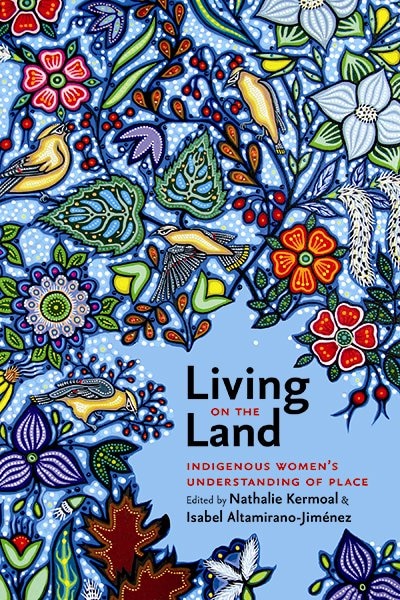 An extensive body of literature on Indigenous knowledge and ways of knowing has been written since the 1980s. This research has for the most part been conducted by scholars operating within Western epistemological frameworks that tend not only to deny the subjectivity of knowledge but also to privilege masculine authority. As a result, the information gathered predominantly reflects the types of knowledge traditionally held by men, yielding a perspective that is at once gendered and incomplete.
An extensive body of literature on Indigenous knowledge and ways of knowing has been written since the 1980s. This research has for the most part been conducted by scholars operating within Western epistemological frameworks that tend not only to deny the subjectivity of knowledge but also to privilege masculine authority. As a result, the information gathered predominantly reflects the types of knowledge traditionally held by men, yielding a perspective that is at once gendered and incomplete.
Even those academics, communities, and governments interested in consulting with Indigenous peoples for the purposes of planning, monitoring, and managing land use have largely ignored the knowledge traditionally produced, preserved, and transmitted by Indigenous women. While this omission reflects patriarchal assumptions, it may also be the result of the reductionist tendencies of researchers, who have attempted to organize Indigenous knowledge so as to align it with Western scientific categories, and of policy makers, who have sought to deploy such knowledge in the service of external priorities. Such efforts to apply Indigenous knowledge have had the effect of abstracting this knowledge from place as well as from the world view and community—and by extension the gender—to which it is inextricably connected. - Publisher's Description
Request this Title
Decolonizing “Prehistory”: Deep Time and Indigenous Knowledges in North America
Mackenthun, Gesa; Mucher, Christen (2021)
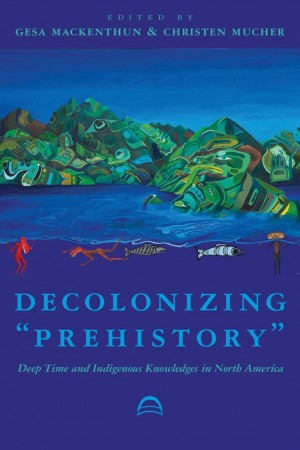 "Decolonizing “Prehistory”" combines a critical investigation of the documentation of the American deep past with perspectives from Indigenous traditional knowledges and attention to ongoing systems of intellectual colonialism. Bringing together experts from American studies, archaeology, anthropology, legal studies, history, and literary studies, this interdisciplinary volume offers essential information about the complexity and ambivalence of colonial encounters with Indigenous peoples in North America, and their impact on American scientific discourse. The chapters in this book reveal how anthropology, archaeology, and cultural heritage have shaped the collective ideological construction of Indigenous cultures, while actively empowering the voices that disrupt conventional tropes and narratives of “prehistory.”
"Decolonizing “Prehistory”" combines a critical investigation of the documentation of the American deep past with perspectives from Indigenous traditional knowledges and attention to ongoing systems of intellectual colonialism. Bringing together experts from American studies, archaeology, anthropology, legal studies, history, and literary studies, this interdisciplinary volume offers essential information about the complexity and ambivalence of colonial encounters with Indigenous peoples in North America, and their impact on American scientific discourse. The chapters in this book reveal how anthropology, archaeology, and cultural heritage have shaped the collective ideological construction of Indigenous cultures, while actively empowering the voices that disrupt conventional tropes and narratives of “prehistory.”
Constructions of America’s ancient past—or the invention of American “prehistory”—occur in national and international political frameworks, which are characterized by struggles over racial and ethnic identities, access to resources and environmental stewardship, the commodification of culture for touristic purposes, and the exploitation of Indigenous knowledges and histories by industries ranging from education to film and fashion. The past’s ongoing appeal reveals the relevance of these narratives to current-day concerns about individual and collective identities and pursuits of sovereignty and self-determination, as well as to questions of the origin—and destiny—of humanity. Decolonizing “Prehistory” critically examines and challenges the paradoxical role that modern scholarship plays in adding legitimacy to, but also delegitimizing, contemporary colonialist practices. - Publisher's Description
Request this Title
Horse Nations: The Worldwide Impact of the Horse on Indigenous Societies Post-1492
Mitchell, Peter (2015)
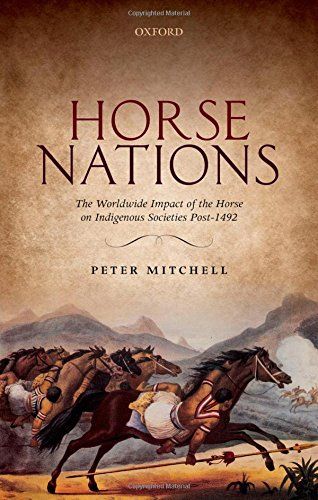 The Native American on a horse is an archetypal Hollywood image, but though such equestrian-focused societies were a relatively short-lived consequence of European expansion overseas, they were not restricted to North America's Plains.
The Native American on a horse is an archetypal Hollywood image, but though such equestrian-focused societies were a relatively short-lived consequence of European expansion overseas, they were not restricted to North America's Plains.
"Horse Nations" provides the first wide-ranging and up-to-date synthesis of the impact of the horse on the Indigenous societies of North and South America, southern Africa, and Australasia following its introduction as a result of European contact post-1492. Drawing on sources in a variety of languages and on the evidence of archaeology, anthropology, and history, the volume outlines the transformations that the acquisition of the horse wrought on a diverse range of groups within these four continents. It explores key topics such as changes in subsistence, technology, and belief systems, the horse's role in facilitating the emergence of more hierarchical social formations, and the interplay between ecology, climate, and human action in adopting the horse, as well as considering how far equestrian lifestyles were ultimately unsustainable. - Publisher's Description
Request this Title
After One Hundred Winters: In Search of Reconciliation on America's Stolen Lands
Jacobs, Margaret (2021)
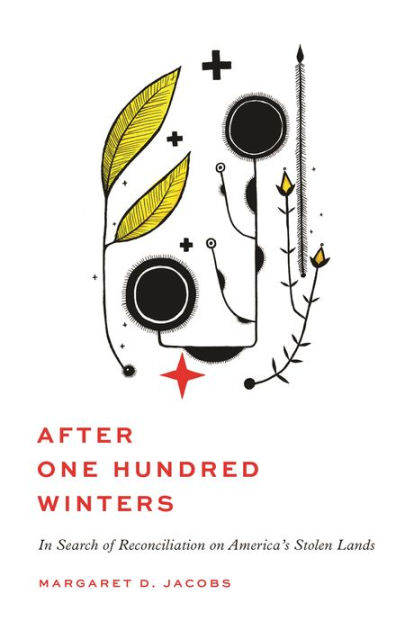 "After One Hundred Winters" confronts the harsh truth that the United States was founded on the violent dispossession of Indigenous people and asks what reconciliation might mean in light of this haunted history. In this timely and urgent book, settler historian Margaret Jacobs tells the stories of the individuals and communities who are working together to heal historical wounds―and reveals how much we have to gain by learning from our history instead of denying it.
"After One Hundred Winters" confronts the harsh truth that the United States was founded on the violent dispossession of Indigenous people and asks what reconciliation might mean in light of this haunted history. In this timely and urgent book, settler historian Margaret Jacobs tells the stories of the individuals and communities who are working together to heal historical wounds―and reveals how much we have to gain by learning from our history instead of denying it.
Jacobs traces the brutal legacy of systemic racial injustice to Indigenous people that has endured since the nation’s founding. Explaining how early attempts at reconciliation succeeded only in robbing tribal nations of their land and forcing their children into abusive boarding schools, she shows that true reconciliation must emerge through Indigenous leadership and sustained relationships between Indigenous and non-Indigenous people that are rooted in specific places and histories. In the absence of an official apology and a federal Truth and Reconciliation Commission, ordinary people are creating a movement for transformative reconciliation that puts Indigenous land rights, sovereignty, and values at the forefront. With historical sensitivity and an eye to the future, Jacobs urges us to face our past and learn from it, and once we have done so, to redress past abuses. - Publisher's Description
Request this Title
Before American History
Mucher, Christen (2022)
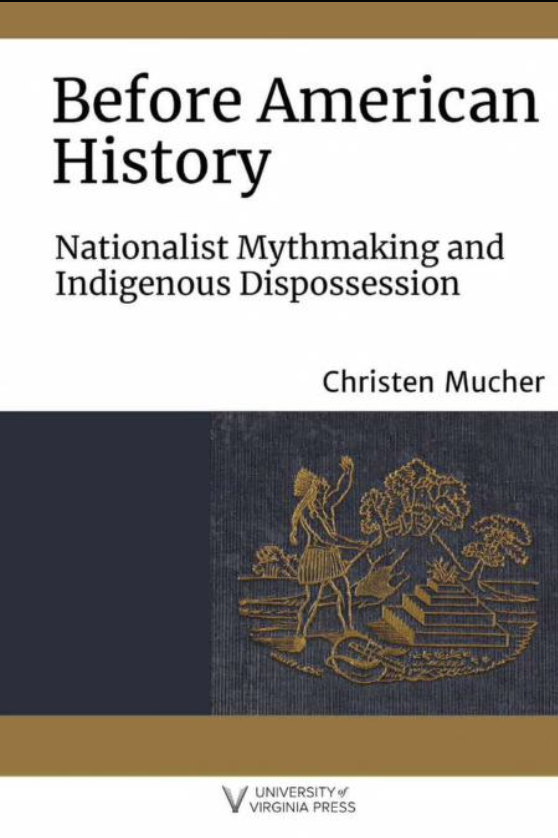 "Before American History" juxtaposes Mexico City’s famous carved Sun Stone with the mounded earthworks found throughout the Midwestern states of the U.S. to examine the project of settler nationalism from the 1780s to the 1840s in two North American republics usually studied separately. As the U.S. and Mexico transformed from European colonies into independent nations—and before war scarred them both—antiquarians and historians compiled and interpreted archives meant to document America’s Indigenous pasts. These settler-colonial understandings of North America’s past deliberately misappropriated Indigenous histories and repurposed them and their material objects as "American antiquities," thereby writing Indigenous pasts out of U.S. and Mexican national histories and national lands and erasing and denigrating Native peoples living in both nascent republics.
"Before American History" juxtaposes Mexico City’s famous carved Sun Stone with the mounded earthworks found throughout the Midwestern states of the U.S. to examine the project of settler nationalism from the 1780s to the 1840s in two North American republics usually studied separately. As the U.S. and Mexico transformed from European colonies into independent nations—and before war scarred them both—antiquarians and historians compiled and interpreted archives meant to document America’s Indigenous pasts. These settler-colonial understandings of North America’s past deliberately misappropriated Indigenous histories and repurposed them and their material objects as "American antiquities," thereby writing Indigenous pasts out of U.S. and Mexican national histories and national lands and erasing and denigrating Native peoples living in both nascent republics.
Christen Mucher creatively recovers the Sun Stone and mounded earthworks as archives of nationalist power and Indigenous dispossession as well as objects that are, at their material base, produced by Indigenous people but settler controlled and settler interpreted. Her approach renders visible the foundational methodologies, materials, and mythologies that created an American history out of and on top of Indigenous worlds and facilitated Native dispossession continent-wide. By writing Indigenous actors out of national histories, Mexican and U.S. elites also wrote them out of their lands, a legacy of erasure and removal that continues when we repeat these eighteenth- and nineteenth-century settler narratives and that reverberates in discussions of immigration, migration, and Nativism today. - Publisher's Description
Request this Title
Lies My Teacher Told Me
Loewen, James (2018)
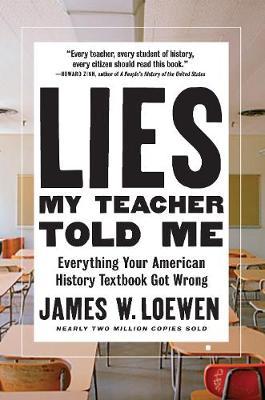 Americans have lost touch with their history, and in Lies My Teacher Told Me Professor James Loewen shows why. After surveying eighteen leading high school American history texts, he has concluded that not one does a decent job of making history interesting or memorable. Marred by an embarrassing combination of blind patriotism, mindless optimism, sheer misinformation, and outright lies, these books omit almost all the ambiguity, passion, conflict, and drama from our past.
Americans have lost touch with their history, and in Lies My Teacher Told Me Professor James Loewen shows why. After surveying eighteen leading high school American history texts, he has concluded that not one does a decent job of making history interesting or memorable. Marred by an embarrassing combination of blind patriotism, mindless optimism, sheer misinformation, and outright lies, these books omit almost all the ambiguity, passion, conflict, and drama from our past.
In this revised edition, packed with updated material, Loewen explores how historical myths continue to be perpetuated in today's climate and adds an eye-opening chapter on the lies surrounding 9/11 and the Iraq War. From the truth about Columbus's historic voyages to an honest evaluation of our national leaders, Loewen revives our history, restoring the vitality and relevance it truly possesses. Thought provoking, nonpartisan, and often shocking, Loewen unveils the real America in this iconoclastic classic beloved by high school teachers, history buffs, and enlightened citizens across the country. - Publisher's Description
Request this Title
